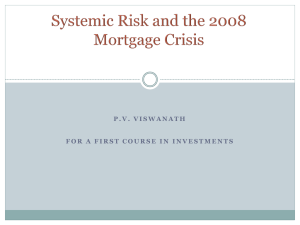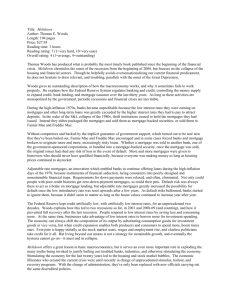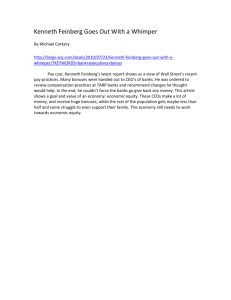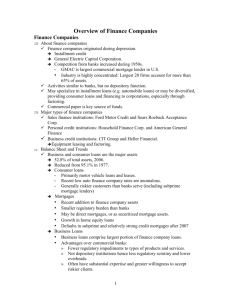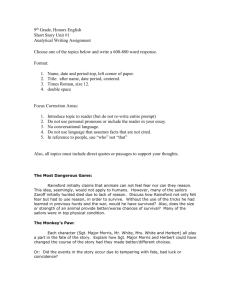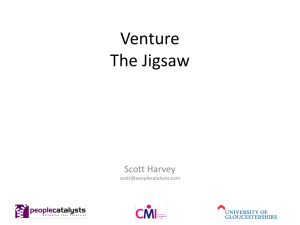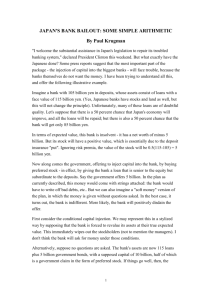Global Credit Crunch
advertisement
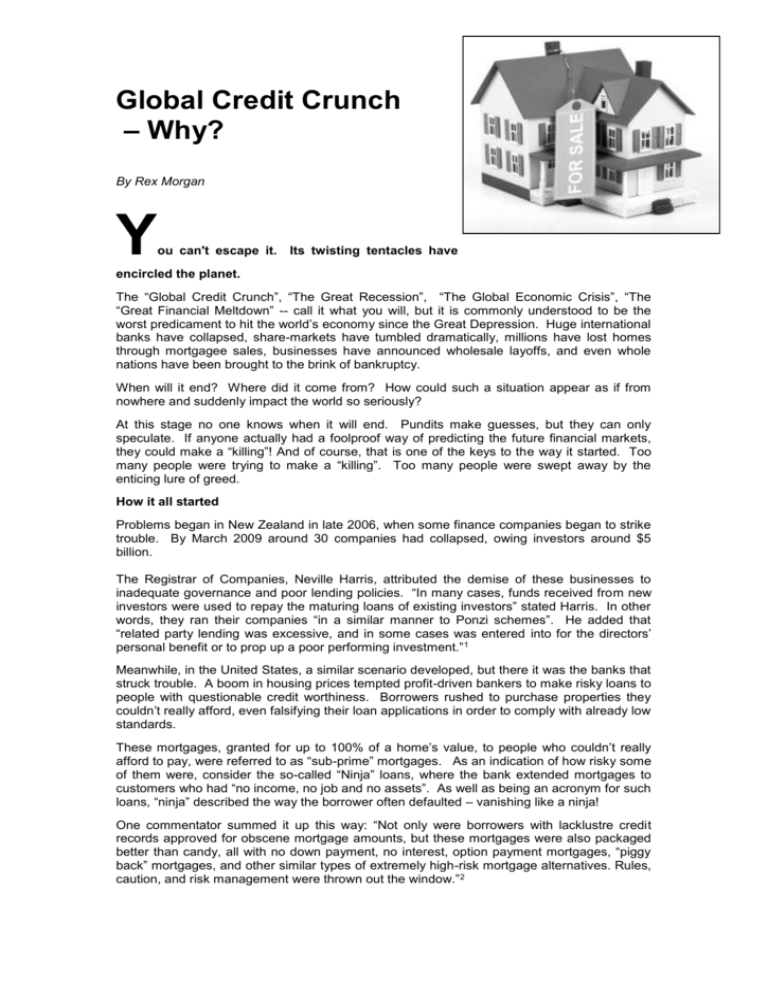
Global Credit Crunch – Why? By Rex Morgan Y ou can't escape it. Its twisting tentacles have encircled the planet. The “Global Credit Crunch”, “The Great Recession”, “The Global Economic Crisis”, “The “Great Financial Meltdown” -- call it what you will, but it is commonly understood to be the worst predicament to hit the world’s economy since the Great Depression. Huge international banks have collapsed, share-markets have tumbled dramatically, millions have lost homes through mortgagee sales, businesses have announced wholesale layoffs, and even whole nations have been brought to the brink of bankruptcy. When will it end? Where did it come from? How could such a situation appear as if from nowhere and suddenly impact the world so seriously? At this stage no one knows when it will end. Pundits make guesses, but they can only speculate. If anyone actually had a foolproof way of predicting the future financial markets, they could make a “killing”! And of course, that is one of the keys to the way it started. Too many people were trying to make a “killing”. Too many people were swept away by the enticing lure of greed. How it all started Problems began in New Zealand in late 2006, when some finance companies began to strike trouble. By March 2009 around 30 companies had collapsed, owing investors around $5 billion. The Registrar of Companies, Neville Harris, attributed the demise of these businesses to inadequate governance and poor lending policies. “In many cases, funds received from new investors were used to repay the maturing loans of existing investors” stated Harris. In other words, they ran their companies “in a similar manner to Ponzi schemes”. He added that “related party lending was excessive, and in some cases was entered into for the directors’ personal benefit or to prop up a poor performing investment.” 1 Meanwhile, in the United States, a similar scenario developed, but there it was the banks that struck trouble. A boom in housing prices tempted profit-driven bankers to make risky loans to people with questionable credit worthiness. Borrowers rushed to purchase properties they couldn’t really afford, even falsifying their loan applications in order to comply with already low standards. These mortgages, granted for up to 100% of a home’s value, to people who couldn’t really afford to pay, were referred to as “sub-prime” mortgages. As an indication of how risky some of them were, consider the so-called “Ninja” loans, where the bank extended mortgages to customers who had “no income, no job and no assets”. As well as being an acronym for such loans, “ninja” described the way the borrower often defaulted – vanishing like a ninja! One commentator summed it up this way: “Not only were borrowers with lacklustre credit records approved for obscene mortgage amounts, but these mortgages were also packaged better than candy, all with no down payment, no interest, option payment mortgages, “piggy back” mortgages, and other similar types of extremely high-risk mortgage alternatives. Rules, caution, and risk management were thrown out the window.”2 When houses are continually rising in price, it is safe for banks to offer mortgages because even if the borrowers default and the houses are sold, the profit on the sales enables the banks to recoup their investments. But what if house prices fall? Then the banks don’t get all of their money back from the insolvent borrowers or their property. In 2007, property prices began to decline and the banks with significant numbers of sub-prime mortgages, which soon became known as “toxic debt”, quickly found themselves in trouble. During 2008, over 2.3 million properties in the US succumbed to foreclosure activity, an 80% increase on the previous year, and an increase of 225% on 2006. (The NZ figures for mortgagee sales have recorded a similar trend.) Eventually the banks had to write down their holdings of sub-prime related securities, seriously undermining their balance sheets. One of the first victims was Northern Rock, a British bank which experienced a run on deposits and had to be nationalised to be saved. The downfall of other banks exposed to toxic mortgages quickly followed, including such leading institutions as Bear Stearns, Lehman Brothers, Citibank, Merrill Lynch, and Royal Bank of Scotland. All three of the major banks of Iceland collapsed, almost causing the bankruptcy of the nation. An IMF report released in April 2009 estimated that bank losses worldwide from toxic assets could reach over NZ$7 trillion. The mind struggles to comprehend a figure of that size! Other excesses While the sub-prime mortgage defaults were a major trigger of the global credit crisis, a number of other credit excesses had also developed during the boom years. Nouriel Roubini, Professor of Economics at New York University, lists an assortment of factors contributing to the crisis: “credit cards, motor vehicle loans, student loans, local government borrowing, leveraged buyouts, hedge funds, commercial and industrial loans, corporate bonds, commodities, and credit default swaps.” 3 He describes the trading of credit default swaps as “a dangerous unregulated market wherein up to $60 trillion of nominal protection was sold against an outstanding stock of corporate bonds of just $6 trillion.” Economist Oskari Juurikkala lays much of the blame on “financial innovations called derivatives, contracts that allow companies to trade risks that derive from some other underlying assets”. Basically, the traders bet on the future change in value of debts and mortgages. “If used properly, derivatives are useful and ethically unobjectionable”, says Juurikkala. But he adds “their abuse is a nightmare. They become a house of cards, built on greed. Recent decades brought much trickier, and riskier, derivatives, such as ‘over-the-counter credit default swaps’. Sound complex? It is.”4 Juurikkala concludes that “in the 1990s and 2000s, credit derivatives became a massive global gamble.” An editorial in The New Zealand Herald summed it up well: “The globalisation of finance flows led to the rapid development of new wholesale markets in derivatives, mortgage-backed securities and other exotic instruments. Bankers took to these with gusto because of their huge profitability. Few stopped to ponder whether the profits were illusory or even to consider a more stringent exercise in risk analysis. Most were seduced by the huge bonuses and other incentives that encouraged them to play on the margins. Gigantic pay packets, corporate jets, country club memberships and lavish junkets were the hallmarks of the new banking culture.”5 The “height of irresponsibility” The generous salaries and bonuses paid to corporate executives while their businesses were struggling have given rise to widespread outrage. Bonuses in the UK totalled seven billion pounds in 2007, causing Prime Minister Gordon Brown to call for a review. “There’s been a great deal of irresponsibility”, he declared on BBC Television.6 President Obama labelled Wall Street bankers as “shameful”, calling it “the height of irresponsibility”, when he noted they had given themselves US$20 billion of bonuses in 2008, despite the financial sector’s abysmal year.7 Commenting on executive salaries and bonuses in Australia, Trade Union President Sharan Burrow said “Corporate Australia, it would seem, has lost its moral compass”. 8 But it is not only corporate executives who have been motivated by materialism. The ordinary people on the street have rushed to amass as much as they can too, borrowing to the hilt on their plastic cards. Recent years have witnessed a phenomenal growth in the usage of credit cards. Cameron Watson, chief investment officer at ABN AMRO Craigs, presents some sobering figures: “Since 1990, household debt in NZ has increased seven-fold, from $25 billion to $175 billion today. Relative to income, this debt represented 60% of average household income in 1990; today it accounts for 160% of income.”9 In other words, we are spending 60% more than we are earning! The common thread One common thread runs throughout these factors underlying the financial crisis: the thread of materialism. Indeed, the root cause behind the global financial crisis can be summed up in just one ugly word: greed. The bankers who made the sub-prime loans were motivated by greed. So were the borrowers who bought houses they couldn’t afford. And the land agents who encouraged people to buy better houses than they could fund. Meanwhile, greedy consumers of other goods loaded up credit cards to the limit of their borrowing capacity. Greedy financiers created new forms of financial instruments to make even greater profits. Greedy directors voted themselves huge bonuses. Eventually the house of cards built on greed began to wobble and fragment. When we talk of greed, we are venturing from the material into the moral realm, an area many of us prefer to avoid as it may reflect on us personally. But it is interesting to consider the impact of moral standards on physical behaviour. Could it be that many of the physical problems faced by mankind have spiritual causes – and therefore spiritual solutions? In this regard it is instructive to look at principles presented thousands of years ago in the Bible. We find outlined there some basic moral values that have stood the test of time, and if followed today would have averted the financial crisis. One of the foundational ten commandments given by God through Moses around 1500BC warned against coveting -- another word for lust, envy or greed.10 When he walked on the earth two millennia ago, Jesus Christ warned, "Watch out! Be on your guard against all kinds of greed; a man's life does not consist in the abundance of his possessions."11 The biblical writer Paul added: “People who want to get rich fall into temptation and a trap and into many foolish and harmful desires that plunge men into ruin and destruction. For the love of money is a root of all kinds of evil.”12 It is important to note that the Bible doesn’t say money or prosperity of itself is wrong. To the contrary, it describes faithful followers of God who were rather wealthy. 13 But it does caution against the love of money, the common human failing of putting the desire for wealth and possessions above that of building loving relationships with others. It warns that if we give in to the enticement of greed it can seductively carry us to disastrous extremes. A classic recent example of this is the notorious story of Bernard Madoff, whose avarice led him to swindle $50 billion dollars off thousands of unsuspecting clients so he and his wife could live in opulence. The excessive desire for more money can drag us into an endless rat-race. As one commentator expressed it well recently, “We spend our lives buying things we don’t need with money we don’t have, to impress people we don’t like.”14 Contentment the Key In contrast, the Bible offers an alternative approach to the way we should view material wealth, proposing the virtue of contentment. After a full life in which he experienced both luxury and impoverishment, the Apostle Paul declared “I have learned the secret of being content in any and every situation, whether well fed or hungry, whether living in plenty or in want.”15 King Solomon, the wise and wealthy monarch of Israel wrote “Whoever loves money never has money enough; whoever loves wealth is never satisfied with his income”. 16 It seems to be a law of life that the more we have, the more we want! Solomon described this poetically with the words “Cast but a glance at riches and they are gone, for they will surely sprout wings and fly off to the sky like an eagle.”17 Solomon’s advice is still good today. “Do not wear yourself out to get rich; have the wisdom to show restraint.”18 After an extensive study of the way to find happiness, he concluded that contentment is the key. “Then I realised that it is good and proper for a man to eat and drink and to find satisfaction in his toilsome labour under the sun during the few days of life God has given him.”19 After all, as Paul reminds us “For we brought nothing into the world, and we can take nothing out of it.”20 Life is like a Monopoly game -- no matter how much you acquire, in the end it all goes back in the box. Contentment is not necessarily a natural quality for us; it may need to be learned. Naturally, we like to get as much as we can for ourselves, and get it as quickly and as easily as we can. But if we can learn to be content with what we have, rather than to greedily grasp for more, we can avoid, at least in our personal lives, the excesses that caused the global credit crunch. Notes 1. Paul McBeth, “Finance companies acted like ‘Ponzi schemes’”, Scoop Business, 23 March, 2009. 2. Inya Ivkovic, “High Risk Mortgages Disaster”, Suite 101.com, 7 September, 2007. 3. Nouriel Roubini, “Warning: More Doom Ahead”, Foreign Policy, Jan-Feb 2009. 4. Oskari Juurikkala, “Greed Hurts: Causes of the Global Financial Crisis”, Acton Institute, 16 January, 2008. 5. The NZ Herald, 14 February, 2009. 6. INUPGE News, 23 September 2008. 7. “Political Punch”, ABC News, 29 January 2009. 8. “Corporate Bonus Hypocrisy”, by Caroline Hutchinson, Sunshine Coast Daily, 6 March 2009. 9. Cameron Watson, “Navigating the Next Bubble”. The NZ Herald, My Generation, March 2009. 10. Exodus 20:17. 11. Luke 12:15. 12. 1 Timothy 6:9-10. 13. Abraham, Joseph, Job, David, Solomon, for example. See Gen 14:4, 39:2-3; Job 1:3; 42:10. 14. Murray Robertson, quoted in “Breaking the 10th Commandment”, by John McNeil, Challenge Weekly, 27 October 2008. 15. Philippians 4:12. 16. Ecclesiastes 5:10. 17. Proverbs 23:5. 18. Proverbs 23:4. 19. Ecclesiastes 5:18. 20. 1 Timothy 6:7. (All Bible quotations are from the New International Version.)
